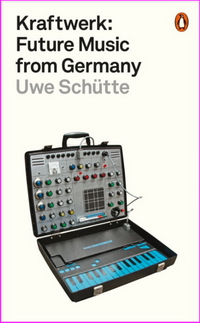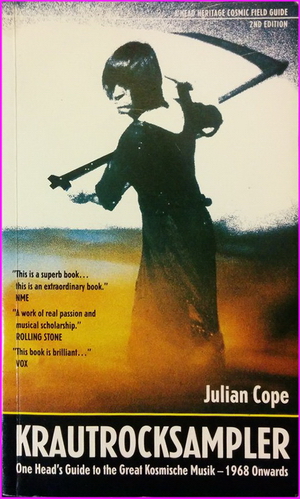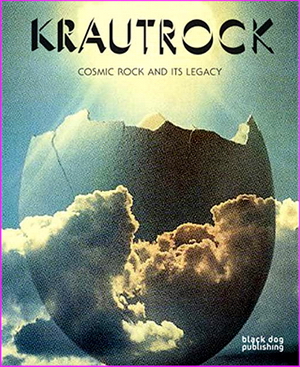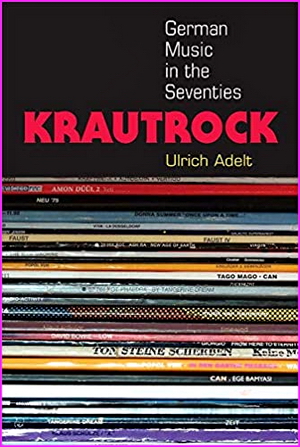| |
|
| |
|
 |
Kraftwerk: Future Music from Germany - Uwe Schütte
(ISBN-13 : 978-0141986753)
The story of the phenomenon that is Kraftwerk, and how they revolutionised our cultural landscape
'We are not artists nor musicians. We are workers.' Ignoring nearly all rock traditions, experimenting in near-total secrecy in their Düsseldorf studio, Kraftwerk fused sound and technology, graphic design and performance, modernist Bauhaus aesthetics and Rhineland industrialisation - even human and machine - to change the course of modern music. This is the story of Kraftwerk the cultural phenomenon, who turned electronic music into avant-garde concept art and created the soundtrack to our digital age. |
| |
|
| |
|
 |
Krautrocksampler: One Head's Guide to the Great Kosmische Music - 1968 Onwards -
Julian Cope
(ISBN-13 : 978-0952671916)
Krautrock Sampler: One Head's Guide to the Great Kosmische Music - 1968 Onwards 2nd Edition in superb condition.From wikipedia:Krautrocksampler: One Head's Guide to the Great Kosmische Musik - 1968 Onwards, written by musicologist and former The Teardrop Explodes singer, Julian Cope, is a book describing the underground music scene in Germany from 1968 through the 1970s. The book was first published in the United Kingdom in 1995 by Head Heritage,...
Despite continued demand for Krautrocksampler, Cope has stated that the book will not be updated or reprinted.Krautrocksampler gives a subjective and very animated account of the phenomenon of krautrock from the perspective of the author, who states: I wrote this short history because of the way I feel about the music, that its supreme Magic and Power has lain Unrecognised for too long.The book comprises a narrative of the rock and roll culture in post-WWII West Germany, along with chapters focusing on individual major artists, including Can, Faust, Tangerine Dream, Neu! and Amon Düül I and II |
| |
|
| |
|
 |
Krautrock: Cosmic Rock and its Legacy - Erik Davis, Michel Faber, David Keenan, Ken Hollings
(ISBN-13 : 978-1906155667)
Krautrock: Cosmic Rock and its Legacy charts the history of this influential music genre, from its roots in free jazz, psychedelia and the music of Karlheinz Stockhausen, to the groundbreaking experiments of Faust, Kraftwerk and Can. The late 1960s in West Germany was a period of profound breakthroughs, upheavals and reversals. Communes were spreading, protests organised throughout the entire country, the desire to begin everything anew permeating the young. Out of this climate, a music scene exploded that would forever change the face of western rock; at times anarchic, at others mystical, magickal, or utopian, it pushed rock beyond any known limits. Never a genre or a movement per se, Krautrock encompassed a very wild and diverse range of sounds, attitudes, and past musics, from free jazz to Karlheinz Stockhausen, from dada to Fluxus, from German Romanticism to the Mothers of Invention. The musicians operated outside any known categories, breaking new ground and turning their backs to both their country's past and the conventions of Anglo-American rock. Their vision fired the imaginations of generations of musicians after them: Cabaret Voltaire, Brian Eno, Nurse with Wound, PiL, DAF, Einstürzende Neubauten, to only name a few, have all acknowledged their debt to Krautrock's uncompromising, outsider ethics and far-out sounds. From the relentless drum beating of Amon Düül, to the eastern tinged mysticism of Popol Vuh and the sonic assaults of Conrad Schnitzler, Krautrock: Cosmic Rock and Its Legacy traces the history of this phenomenon. Illustrated with concert photos, posters, record cover art and other rare visual material, and also including essays by Michel Faber, Erik Davis, David Stubbs, Ken Hollings and testimonials from Gavin Russom (Delia and Gavin/Black Meteoric Star), Plastic Crimewave, Stephen Thrower (Coil/Cyclobe), and Ann Shenton (Add N to (X)) this is an essential compendium to a music whose spirit and ideas still vibrate through contemporary culture today. |
| |
|
| |
|
 |
Krautrock: German Music in the Seventies (Tracking Pop) - Ulrich Adelt
(ISBN-13 : 978-0472053193)
Krautrock is a catch-all term for the music of various white German rock groups of the 1970s that blended influences of African American and Anglo-American music with the experimental and electronic music of European composers. Groups such as Can, Popol Vuh, Faust, and Tangerine Dream arose out of the German student movement of 1968 and connected leftist political activism with experimental rock music and, later, electronic sounds. Since the 1970s, American and British popular genres such as indie, post-rock, techno, and hip-hop have drawn heavily on krautrock, ironically reversing a flow of influence krautrock originally set out to disrupt.
Among other topics, individual chapters of the book focus on the redefinition of German identity in the music of Kraftwerk, Can, and Neu!; on community and conflict in the music of Amon Düül, Faust, and Ton Steine Scherben; on “cosmic music” and New Age; and on Donna Summer’s and David Bowie’s connections to Germany. Rather than providing a purely musicological or historical account, Krautrock discusses the music as being constructed through performance and articulated through various forms of expressive culture, including communal living, spirituality, and sound. |
| |
|
| |
|
|